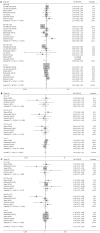Association of interleukin-10 polymorphisms with risk of irritable bowel syndrome: a meta-analysis
- PMID: 24409078
- PMCID: PMC3882424
- DOI: 10.3748/wjg.v19.i48.9472
Association of interleukin-10 polymorphisms with risk of irritable bowel syndrome: a meta-analysis
Abstract
Aim: To clarify the current understanding of the association between interleukin-10 (IL-10) polymorphisms and the risk of irritable bowel syndrome (IBS).
Methods: We searched for studies in any language recorded in PubMed, Embase and Cochrane library before August 2013. The associations under allele contrast model, codominant model, dominant model, and recessive model were analyzed. The strengths of the association between IL-10 polymorphisms and IBS risk were estimated using odds ratios (OR) with 95% confidence interval (CI). Fixed effects model was used to pool the result if the test of heterogeneity was not significant, otherwise the random-effect model was selected.
Results: Eight case-control studies analyzing three single-nucleotide polymorphisms rs1800870 (-1082 A/G), rs1800871 (-819C/T), and rs1800872 (-592A/C) of the IL-10 gene, which involved 928 cases and 1363 controls, were eligible for our analysis. The results showed that rs1800870 polymorphisms were associated with a decreased risk of IBS (GG+GA vs AA: OR = 0.80, 95%CI: 0.66-0.96), (AA+GA vs GG: OR = 0.68, 95%CI: 0.52-0.90). Subgroup analysis revealed such association only existed in Caucasian ethnicity (AA+GA vs GG, OR = 0.70, 95%CI: 0.55-0.89). The rs1800872 polymorphisms were associated with an increased risk of IBS in Asian ethnicity (CC vs GG: OR = 1.29, 95%CI: 1.01-1.16). There were no associations between rs1800871 polymorphisms and the IBS risk.
Conclusion: The results suggest that IL-10 rs1800870 confers susceptibility to the risk of IBS in Caucasian ethnicity, and the rs1800872 may associate with IBS risk in Asians. However, no significant associations are found between rs1800871 and IBS risk.
Keywords: Case-control; Gene polymorphism; Interleukin-10; Irritable bowel syndrome; Meta-analysis.
Figures
References
-
- Der T, Bercik P, Donnelly G, Jackson T, Berezin I, Collins SM, Huizinga JD. Interstitial cells of cajal and inflammation-induced motor dysfunction in the mouse small intestine. Gastroenterology. 2000;119:1590–1599. - PubMed
-
- Galeazzi F, Haapala EM, van Rooijen N, Vallance BA, Collins SM. Inflammation-induced impairment of enteric nerve function in nematode-infected mice is macrophage dependent. Am J Physiol Gastrointest Liver Physiol. 2000;278:G259–G265. - PubMed
-
- Chadwick VS, Chen W, Shu D, Paulus B, Bethwaite P, Tie A, Wilson I. Activation of the mucosal immune system in irritable bowel syndrome. Gastroenterology. 2002;122:1778–1783. - PubMed
-
- O’Sullivan M, Clayton N, Breslin NP, Harman I, Bountra C, McLaren A, O’Morain CA. Increased mast cells in the irritable bowel syndrome. Neurogastroenterol Motil. 2000;12:449–457. - PubMed
Publication types
MeSH terms
Substances
LinkOut - more resources
Full Text Sources
Other Literature Sources



